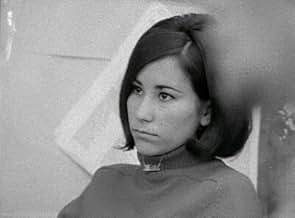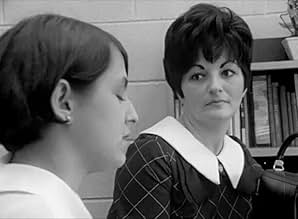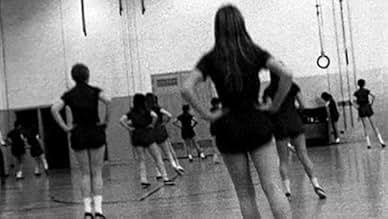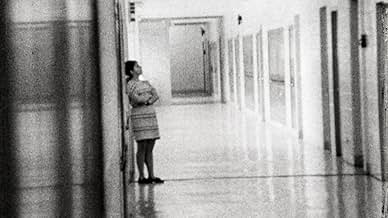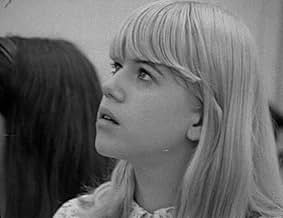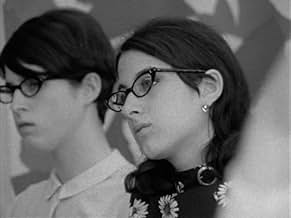IMDb RATING
7.5/10
2.4K
YOUR RATING
Documentary filmmaker Frederick Wiseman takes us inside Northeast High School as a fly on the wall to observe the teachers and how they interact with the students.Documentary filmmaker Frederick Wiseman takes us inside Northeast High School as a fly on the wall to observe the teachers and how they interact with the students.Documentary filmmaker Frederick Wiseman takes us inside Northeast High School as a fly on the wall to observe the teachers and how they interact with the students.
- Director
- Awards
- 1 win total
Featured reviews
I attended Northeast High School shortly after the movie was filmed. It is a disturbingly accurate presentation. Mr. Wiseman's cinema verite approach has encapsulated that time and space in the way to which historical endeavors aspire, but rarely achieve. The black and white format, while most likely driven by technology and cost, perfectly underscores the bland, but far from sterile, environment. While no accounting, regardless of volume, objectivity or technical accuracy, can fully convey an experience, this film merits its standing as an excellent historical work.
I remember the staff and how they made me feel. From comments I have read here and elsewhere, the movie provides the right mix of raw material for the audience to experience what I did. Or, if they "just don't get it," like the staff at the school, they will see what the staff did when the movie was made. Only after viewers expressed what they saw did the cast become incensed with what they later recalled as deceptive, malicious, slanderous abuses of trust. One teacher remarked to my class that the cameras were equipped with secret mirrors, so they could surreptitiously capture other than what they appeared to be filming. The movie was banned from Philadelphia for a number of years. This was during the Cold War. I remember wondering if people in the Soviet Union were allowed to watch it, and if I would be arrested should I smuggle it into the city.
With pathetically few exceptions, the teachers and administrators were generally condescending, arbitrarily authoritative, and guided by their own biases. They cared little for the students as learners or human beings, were poorly qualified to communicate, let alone teach, and were surprisingly more ignorant of current events than most of the students.
There was one notable exception, and I wish Mr. Wiseman could have found a way to weave it into the film's cloth without betraying its honesty.
The dean of students, figuring prominently in the movie, known as "The Mean Dean" in my day, taught my 12th grade history class. I was fortunate not to have known him in the more familiar context. At least that's what my memory tells me. With his Frank Rizzo haircut, overwhelming physical presence, brutal manner of speech, and distinctive gait owing to severe WW2 injuries, he contrasted with all of the other social sciences teachers in every way.
At the start of the school year, he explained that his â?odeanâ? alter ego would never enter the classroom and he held to that. He was honest about his opinions, never declining a straight question. He admitted what he didn't know or understand, and welcomed input from the class. He proudly related how the GI Bill allowed him to make a good life after his horrible experience in the war, his Corvette indulgence that was not popular with staff, and an almost childlike fascination with the complexity of the world. His unambiguous goal was to encourage the students to be skeptical of news and politics, to collect information from many sources, and to analyze and draw their own conclusions. It was one of the only classes in which we were taught to think for ourselves. The only textbook was a mandatory subscription to the Sunday New York Times, which we were required to read. Class assignments consisted of our comments and analyses of articles and editorials. Grading was based entirely on quality of the analysis. He was excruciatingly critical of process, and completely oblivious to content. I donâ?Tt know how he felt about the late Justice, but for me William Brennan and my 12th grade history teacher are my two First Amendment icons. I agreed with almost none of his very clearly expressed opinions. Still, I remember this as the most liberal of any class in my public school education.
There was one other notable exception to the gray abyss of high school. The SPARC extracurricular program, and its associated magnet program curriculum for the tiny clique of "advanced placement" students, was one bright spot in the school district's otherwise unenviable history. But it was so academically and physically isolated from the school mainstream, I don't see how it could have been accurately integrated into this movie. The shame is that the excellent teachers and equipment afforded by the program were not available to the large majority of students.
The reading of the soldier's letter was a perfect closing, as it so perfectly distilled the utter ignorance of that generation of teachers and administrators. There has been some progress in the intervening 30+ years, but there has also been some backsliding. "High School" remains, sadly, a timely insight into the education system in this country.
I remember the staff and how they made me feel. From comments I have read here and elsewhere, the movie provides the right mix of raw material for the audience to experience what I did. Or, if they "just don't get it," like the staff at the school, they will see what the staff did when the movie was made. Only after viewers expressed what they saw did the cast become incensed with what they later recalled as deceptive, malicious, slanderous abuses of trust. One teacher remarked to my class that the cameras were equipped with secret mirrors, so they could surreptitiously capture other than what they appeared to be filming. The movie was banned from Philadelphia for a number of years. This was during the Cold War. I remember wondering if people in the Soviet Union were allowed to watch it, and if I would be arrested should I smuggle it into the city.
With pathetically few exceptions, the teachers and administrators were generally condescending, arbitrarily authoritative, and guided by their own biases. They cared little for the students as learners or human beings, were poorly qualified to communicate, let alone teach, and were surprisingly more ignorant of current events than most of the students.
There was one notable exception, and I wish Mr. Wiseman could have found a way to weave it into the film's cloth without betraying its honesty.
The dean of students, figuring prominently in the movie, known as "The Mean Dean" in my day, taught my 12th grade history class. I was fortunate not to have known him in the more familiar context. At least that's what my memory tells me. With his Frank Rizzo haircut, overwhelming physical presence, brutal manner of speech, and distinctive gait owing to severe WW2 injuries, he contrasted with all of the other social sciences teachers in every way.
At the start of the school year, he explained that his â?odeanâ? alter ego would never enter the classroom and he held to that. He was honest about his opinions, never declining a straight question. He admitted what he didn't know or understand, and welcomed input from the class. He proudly related how the GI Bill allowed him to make a good life after his horrible experience in the war, his Corvette indulgence that was not popular with staff, and an almost childlike fascination with the complexity of the world. His unambiguous goal was to encourage the students to be skeptical of news and politics, to collect information from many sources, and to analyze and draw their own conclusions. It was one of the only classes in which we were taught to think for ourselves. The only textbook was a mandatory subscription to the Sunday New York Times, which we were required to read. Class assignments consisted of our comments and analyses of articles and editorials. Grading was based entirely on quality of the analysis. He was excruciatingly critical of process, and completely oblivious to content. I donâ?Tt know how he felt about the late Justice, but for me William Brennan and my 12th grade history teacher are my two First Amendment icons. I agreed with almost none of his very clearly expressed opinions. Still, I remember this as the most liberal of any class in my public school education.
There was one other notable exception to the gray abyss of high school. The SPARC extracurricular program, and its associated magnet program curriculum for the tiny clique of "advanced placement" students, was one bright spot in the school district's otherwise unenviable history. But it was so academically and physically isolated from the school mainstream, I don't see how it could have been accurately integrated into this movie. The shame is that the excellent teachers and equipment afforded by the program were not available to the large majority of students.
The reading of the soldier's letter was a perfect closing, as it so perfectly distilled the utter ignorance of that generation of teachers and administrators. There has been some progress in the intervening 30+ years, but there has also been some backsliding. "High School" remains, sadly, a timely insight into the education system in this country.
10kamerad
Lately I've been exploring the issue of ethics in the films of Fredrick Wiseman. In my entry on "Titticut Follies", among other things, I discussed how Wiseman's clear judgmental stance might be considered by some to be a breach of documentary ethics. Some feel that the goal of documentary is to be as objective as possible, others feels that it should be used as a tool for social change. Wiseman falls somewhere in the middle.
Wiseman has stated that with "Titticut Follies" and his next film, "High School", he had more of a fixed idea of what he was trying to go for (as opposed to his later, more thematically ambiguous films). But even so, that does not mean that the individual member of the audience cannot get what he or she wants out of what has just been seen. In a 1998 interview with "The Boston Pheonix", Wiseman stated: "When [High School] was first shown in Boston, in 1969, one of the people who saw it was a very conservative member of the Boston School Committee. I thought she'd hate the movie. But she came up and said, 'Mr. Wiseman, that was a wonderful high school!' I thought she was kidding me until I realized she was on the other side from me on all the value questions. Everything I thought I was parodying, she thought was great. I don't think her reaction represents a failure of the film. Instead, we have an illustration that reality is ambiguous, a complex mirror that the 'real' film takes place where the mind of the viewer meets the screen. It's how the viewer interprets the events."
In the above case, it would seem that the film is only unfair if you dislike what you see. The woman disagreed with what Wiseman was saying, but she still liked the film, because she felt that the images were strong enough to counter what Wiseman's intentions for the film were. So then does it really matter if he was "parodying" his subjects?
Of course we could look deeper into a film like "High School", at more minute details, to see better, less broad examples of what could be considered unethical practices. In one scene, a teacher teaches a class and we see a close-up of her face, wearing thick, horn-rimmed glasses. About this shot, Calvin Pryluck writes, "One can wonder how the teacher in High School feels about herself since seeing herself seeing her bottle-thick eyeglass lenses larger than life on the screen." Small matters like this are important. But is the woman's appearance Wiseman's problem? Perhaps he chose the close up to emphasize the look on her face. Perhaps then if the woman feels embarrassed, then that is for her to worry about, no one else.
Wiseman has stated that with "Titticut Follies" and his next film, "High School", he had more of a fixed idea of what he was trying to go for (as opposed to his later, more thematically ambiguous films). But even so, that does not mean that the individual member of the audience cannot get what he or she wants out of what has just been seen. In a 1998 interview with "The Boston Pheonix", Wiseman stated: "When [High School] was first shown in Boston, in 1969, one of the people who saw it was a very conservative member of the Boston School Committee. I thought she'd hate the movie. But she came up and said, 'Mr. Wiseman, that was a wonderful high school!' I thought she was kidding me until I realized she was on the other side from me on all the value questions. Everything I thought I was parodying, she thought was great. I don't think her reaction represents a failure of the film. Instead, we have an illustration that reality is ambiguous, a complex mirror that the 'real' film takes place where the mind of the viewer meets the screen. It's how the viewer interprets the events."
In the above case, it would seem that the film is only unfair if you dislike what you see. The woman disagreed with what Wiseman was saying, but she still liked the film, because she felt that the images were strong enough to counter what Wiseman's intentions for the film were. So then does it really matter if he was "parodying" his subjects?
Of course we could look deeper into a film like "High School", at more minute details, to see better, less broad examples of what could be considered unethical practices. In one scene, a teacher teaches a class and we see a close-up of her face, wearing thick, horn-rimmed glasses. About this shot, Calvin Pryluck writes, "One can wonder how the teacher in High School feels about herself since seeing herself seeing her bottle-thick eyeglass lenses larger than life on the screen." Small matters like this are important. But is the woman's appearance Wiseman's problem? Perhaps he chose the close up to emphasize the look on her face. Perhaps then if the woman feels embarrassed, then that is for her to worry about, no one else.
Sometimes the best films are those truest to themselves. There's nothing phony about this movie. It's a time capsule. It captured a cloistered, closed system from within. The results are spellbinding.
The faculty of NorthEast high school in Philadelphia are the stars. The viewer decides whether their actions are good or bad. There's certain purity at work. Is it an imperfect system? You bet it is. Do rules appear petty and draconian? Yes, they do. But there is hope inside the bubble. The faculty at NorthEast could be teachers at my high school. We have the flat-topped disciplinarian, the hip, young English teacher, the no-nonsense fashion matron, and the boring instructor with the bad teeth.
The scene with the coach and the graduate who visited while on leave from Vietnam illustrated one of the prominent themes; this environment is in a bubble insulated from community and society. In this scene, the coach made a connection between a soldier's war wound and the effect on his sports career. He was so wrapped up in his role as the school coach; he immediately applied news from the outside world to his microcosmic world inside the school grounds.
This theme was also reiterated by a boy in one of the rare scenes where students were the stars. The would-be bohemian said as much; this school is a cloistered, closed system. The bubble theme is further underscored by the sequence where three boys emerged from a space capsule simulator after 193 hours. There was much fanfare for the successful end to 'Project SPARC' including a telegram from astronaut Gordon Cooper, read with typical dragnet-style inflection by the sponsoring teacher.
In fact, several scenes feature extended recitations of written material by instructors who suffer from chronic educational ennui. There is the flat rendition of 'Casey at the Bat', the review of the typing test text, and the dreaded retelling of the "thought for the day" from the daily bulletin. A glimpse of self-awareness offered by a young English teacher was most startling. In the course of dissecting Paul Simon's poem "The Dangling Conversation", she read it aloud first, and followed with the Simon & Garfunkel song version. She told the students to listen to both versions. The poem came alive with the music. A lingering shot of the teacher showed the hope in her eyes that someone will get the message. For me, it's the best sequence in the film. If Wiseman wanted to underscore a failure of the system, it lied not with the disciplinarian tactics or heavy-handed advice dispensed by the staff, but with the inadequacy of the delivery methods used by educators.
The message turns hopeful in the last scene. A teacher reads a letter at a faculty meeting written by the former student on station in Vietnam. Tight camera work reveals the emotion of the reader, in contrast to the non expressive faces of the previous speakers. The written word provides power after all. There's hope on the part of the student to survive outside the system, hope on the part of the administrator reading the note that they do have an impact on their charges, and hope that inside a flawed machine such as the educational system, someone gets the message.
The faculty of NorthEast high school in Philadelphia are the stars. The viewer decides whether their actions are good or bad. There's certain purity at work. Is it an imperfect system? You bet it is. Do rules appear petty and draconian? Yes, they do. But there is hope inside the bubble. The faculty at NorthEast could be teachers at my high school. We have the flat-topped disciplinarian, the hip, young English teacher, the no-nonsense fashion matron, and the boring instructor with the bad teeth.
The scene with the coach and the graduate who visited while on leave from Vietnam illustrated one of the prominent themes; this environment is in a bubble insulated from community and society. In this scene, the coach made a connection between a soldier's war wound and the effect on his sports career. He was so wrapped up in his role as the school coach; he immediately applied news from the outside world to his microcosmic world inside the school grounds.
This theme was also reiterated by a boy in one of the rare scenes where students were the stars. The would-be bohemian said as much; this school is a cloistered, closed system. The bubble theme is further underscored by the sequence where three boys emerged from a space capsule simulator after 193 hours. There was much fanfare for the successful end to 'Project SPARC' including a telegram from astronaut Gordon Cooper, read with typical dragnet-style inflection by the sponsoring teacher.
In fact, several scenes feature extended recitations of written material by instructors who suffer from chronic educational ennui. There is the flat rendition of 'Casey at the Bat', the review of the typing test text, and the dreaded retelling of the "thought for the day" from the daily bulletin. A glimpse of self-awareness offered by a young English teacher was most startling. In the course of dissecting Paul Simon's poem "The Dangling Conversation", she read it aloud first, and followed with the Simon & Garfunkel song version. She told the students to listen to both versions. The poem came alive with the music. A lingering shot of the teacher showed the hope in her eyes that someone will get the message. For me, it's the best sequence in the film. If Wiseman wanted to underscore a failure of the system, it lied not with the disciplinarian tactics or heavy-handed advice dispensed by the staff, but with the inadequacy of the delivery methods used by educators.
The message turns hopeful in the last scene. A teacher reads a letter at a faculty meeting written by the former student on station in Vietnam. Tight camera work reveals the emotion of the reader, in contrast to the non expressive faces of the previous speakers. The written word provides power after all. There's hope on the part of the student to survive outside the system, hope on the part of the administrator reading the note that they do have an impact on their charges, and hope that inside a flawed machine such as the educational system, someone gets the message.
I just tripped over this review and was brought back by the comment from geprescott in 2003. I was also a student at Northeast High School, graduating in 1970.
What I do remember about the pieces I saw was they were real but not quite true. These are images from long ago, but there was something of the fact that most teachers were trying and not intending to be caricatures as I remember them appearing in the film.
What really got me to write was the description of the disciplinarian dean. I also had him as a 12th grade history teacher. Everything said about him by geprescott was very accurate. Our class was not required to read the Sunday New York Times, but I remember the year long project was to choose a country, research it, and then write its foreign policy. I picked the Soviet Union, did my research, and wrote a paper aimed at making life as difficult as possible for the US. I don't remember the actual comments but I remember being pleased with the final grade.
I never saw this entire film and am not sure where to find it now. I'd like to watch it with my kids.
What I do remember about the pieces I saw was they were real but not quite true. These are images from long ago, but there was something of the fact that most teachers were trying and not intending to be caricatures as I remember them appearing in the film.
What really got me to write was the description of the disciplinarian dean. I also had him as a 12th grade history teacher. Everything said about him by geprescott was very accurate. Our class was not required to read the Sunday New York Times, but I remember the year long project was to choose a country, research it, and then write its foreign policy. I picked the Soviet Union, did my research, and wrote a paper aimed at making life as difficult as possible for the US. I don't remember the actual comments but I remember being pleased with the final grade.
I never saw this entire film and am not sure where to find it now. I'd like to watch it with my kids.
Quite a remarkable study of an anonymous high school. Wiseman's strength in this film is definitely editing. He has taken seemingly a mountain of footage from probably a year in a high school and selected choice bits to make a film that completely engages, despite the apparent lack of character development and traditional narrative. The scenes and moments are incredibly interesting and glue you to the screen. Some of the best treasures are in the tiny concrete room where kids argue about their detentions. A teacher shows girls how to strut their stuff, and boys learn all about sex from a jolly gynecologist.
If you can get your hands on a copy of this, sit back and enjoy!
If you can get your hands on a copy of this, sit back and enjoy!
Did you know
- TriviaThis film was selected to the National Film Registry, Library of Congress, in 1991.
- Quotes
Male Authority Figure: It's nice to be individualistic, but there are certain places to be individualistic.
Female Student: I didn't mean to be individualistic.
Male Authority Figure: No, I'm not criticizing!
- ConnectionsFollowed by High School II (1994)
- Soundtracks(Sittin' On) The Dock of the Bay
(uncredited)
Written by Steve Cropper and Otis Redding
Performed by Otis Redding
- How long is High School?Powered by Alexa
Details
- Release date
- Country of origin
- Official sites
- Languages
- Also known as
- Student Affairs
- Filming locations
- Production company
- See more company credits at IMDbPro
- Runtime
- 1h 15m(75 min)
- Color
- Sound mix
Contribute to this page
Suggest an edit or add missing content

